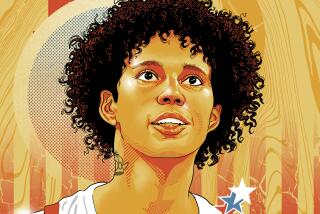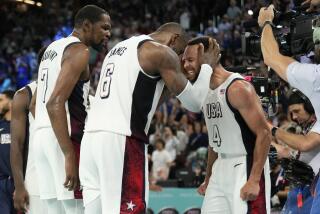A scoring machine shows numbers aren’t everything
LAS VEGAS -- Heavenly shades of night are falling, it’s twilight time for another U.S. basketball team.
Suspended between America’s dreams and recurring nightmares, this team is living up to the usual great expectations amid the usual casual interest: small crowds, a thin press corps, ESPN announcers doing the games from the studio in Bristol, Conn.
Unlike any team that ever competed in the NBA or NCAA, a U.S. team is judged solely by its bad outings.
If it destroys all in its path, it goes into the pantheon with Bill Russell’s 1956 team, Jerry West’s and Oscar Robertson’s in 1960, Bob Knight’s in 1984 and the 1992 Dream Team, itself.
Winning unimpressively, or even letting Mexico score 100 points as it did Monday, is a mild embarrassment.
Losing a game, let alone a tournament, is a disaster.
Losing year after year. . . as the U.S. has since 2000, failing even to make the finals in one Olympics and two World Championships. . . well, that’s where this team comes in.
Without fanfare, nine players have turned over from last summer’s young U.S. roster to this grown-up one, led by veterans like Jason Kidd and. . . Kobe Bryant?
Rising from the ashes of his latest misadventure in his inimitable style, Bryant is not only admired but accepted as a leader by peers who were so leery so recently.
“I’ll be honest with you,” says U.S. director Jerry Colangelo, “when I first started this process, as I spoke with a lot of people I respect a great deal in the game, there were a lot of people who were down on him. . .
“I knew what he was as a player. I knew what he was as a competitor and I knew if he was focused on wanting to be part of this, you couldn’t ask for a better guy.
“So he was one of the first people I spoke with. I didn’t listen to peers on Kobe Bryant.”
The U.S. moves the ball better with Kidd, shoots it better with Michael Redd and plays with Bryant’s urgency. If nothing counts short of the victory stand -- at Beijing, not here -- they look more cohesive than any U.S. team in years.
“You can have a whole bunch of great players and put them on the floor together, that doesn’t mean they’re that hard to beat,” said Canada Coach Leo Rautins after a 50-point loss to the U.S.
“They’re all going to have to sacrifice their games and do a lot of different things and they’re not in their element.
“But when you take a bunch off great players like this and they play together and they work hard at both ends, you’ve got a problem.
“These guys, the chemistry is tremendous on the floor. Every one of those guys is willing to make an extra pass, swing the ball and they’re all getting after it defensively.”
On the other hand, what else is new?
A new day seemed at hand last summer too, with Colangelo’s hand-picked coach, Mike Krzyzewski, replacing the old ad hoc approach with a carefully designed three-year program.
Watching his team share the ball in training camp, Krzyzewski said, “That’s the way the game should be played. These guys get it.”
They got it all right, winning their first seven games by an average of 25 points, before Greece upended them in the kind of indignity U.S. officials thought they had gotten past.
Et tu, Greece?
It was the Americans’ seventh loss since 2000 (Argentina twice, Yugoslavia, Spain, Puerto Rico, Lithuania, Greece) and another long off-season.
“It sounds like an excuse but it’s not -- losing at that time probably was a positive for us,” said Colangelo last week.
“I would have preferred not to have to qualify this summer. But that loss hurt so deeply, it kind of created more resolve. And this is all about winning the gold medal in Beijing. . .
“In my opinion, it’s not about who we are playing. It’s about us. It’s about us getting ready for our journey.”
It’s a journey like no one else’s. Foreign teams are more cohesive because they have a few top players, most of whom come year after year.
The U.S. picks 12 out of the top 50. Unfortunately for the Americans, their blinding stardom tends to remove fear from the equation until they find themselves in a close game with an experienced team on a hot-shooting night, like Greece, and the weight of expectations crashes down.
“It is different because other countries can be in cycles and if they lost a game, it’s not the end of the world,” says Krzyzewski.
“We know that the biggest story is if we lose, or if we don’t play well. We have to create a climate then where we’re having fun without that type of scrutiny.
“I mean, we know it’s there but these guys are just playing. That comes with the territory.”
Happily for Krzyzewski, if last year’s team got it, this one really gets it, at both ends of the floor. In early games, Krzyzewski put the 6-foot-6 Bryant on opposing point guards, like Venezuela’s young Greivis Vasquez in the opener, when Bryant dived on the floor on the game’s second play.
“Kobe is a dominant personality,” says Colangelo. “Kobe is maybe the best player in the game right now. . . .
“The first play of the game a couple of nights ago [diving on the floor in the opener], that set the tone. Not just for that game. That made a statement.”
Against Brazil, Bryant got to guard speedy little Leandro Barbosa, who came in averaging a tournament-leading 27 points and finished with four, looking like a bird in the wash of a jet engine.
Once while the U.S. shot a free throw and Barbosa waited at the other end of the floor, Bryant spent the entire time leaning on him. Barbosa didn’t stick around to talk to the press afterward but you could almost read his mind:
“Dude, don’t you know it’s summer?”
Being Kobe Bryant means not caring whether it’s Vasquez or Barbosa in practice or a game.
“He’s been nothing but humble, man, coming in trying to lead,” says teammate Chauncey Billups of Bryant. “You see what he’s going defensively out there, picking the tempo up every single time and raising the bar for everybody else.
“I’m not surprised about Kobe at all. I sit here and I watch him and I see him getting up super-early every morning and lifting weights. He puts so much into it, I’m not surprised at all.”
By now, nobody should be surprised when Bryant’s positive attributes make up for his bad times, like his early summer media blitz, since he has done this over and over.
“It’s different,” Bryant says. “You get to just have fun. You don’t have to worry about anything else but just going out and playing and then you just marvel at some of the spectacular plays that guys make. I mean, it’s something.”
It’s different for him and he’s different for them. Vive la difference.
--
More to Read
Go beyond the scoreboard
Get the latest on L.A.'s teams in the daily Sports Report newsletter.
You may occasionally receive promotional content from the Los Angeles Times.






